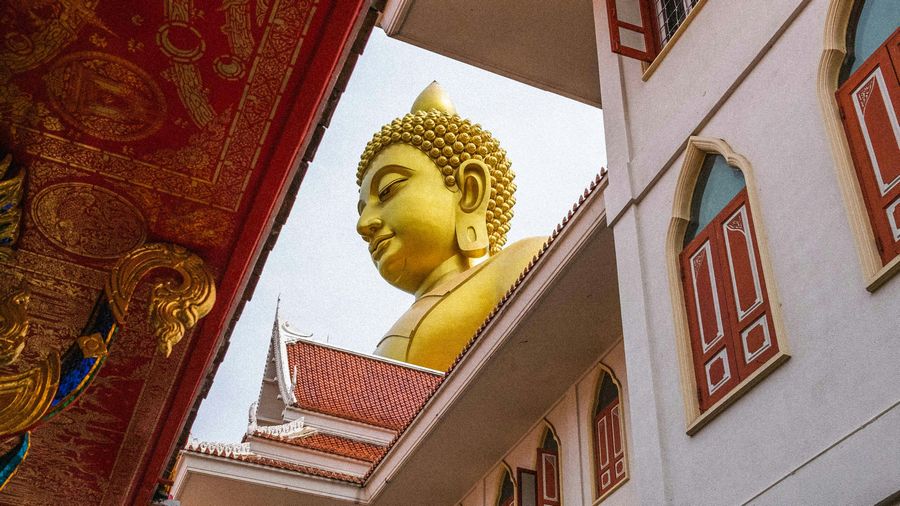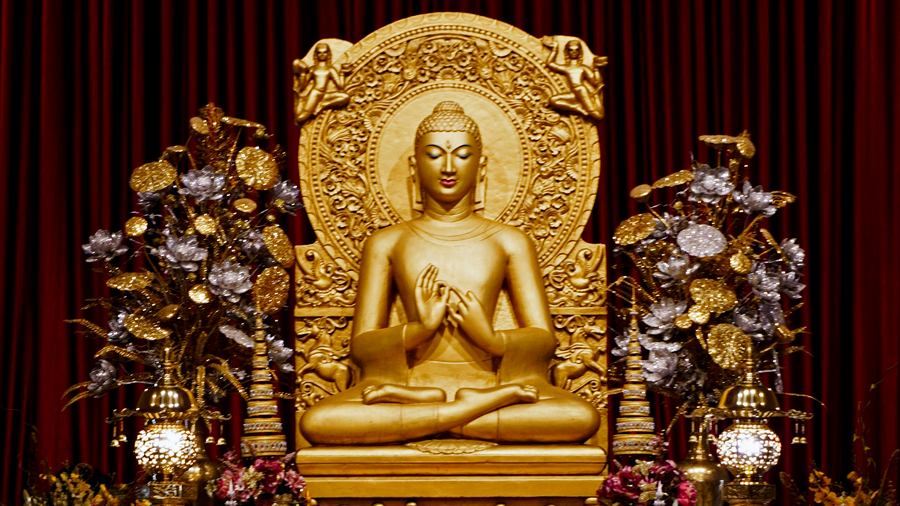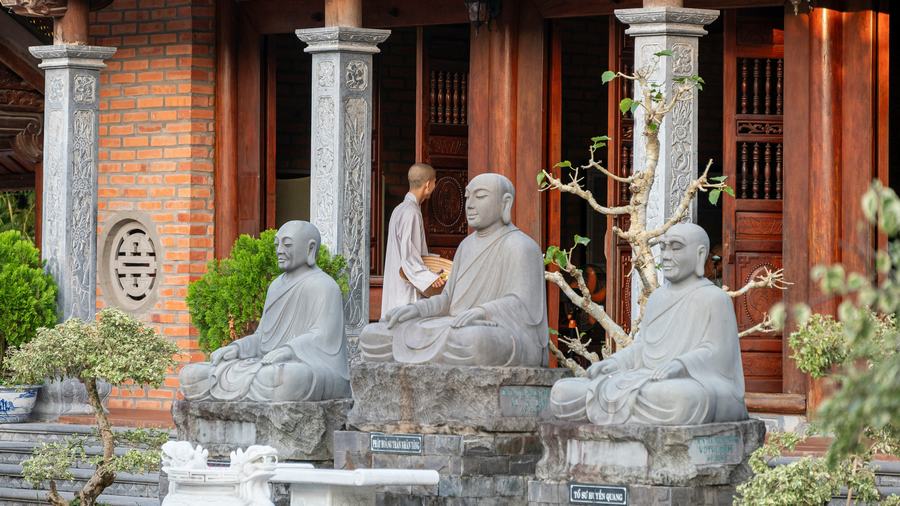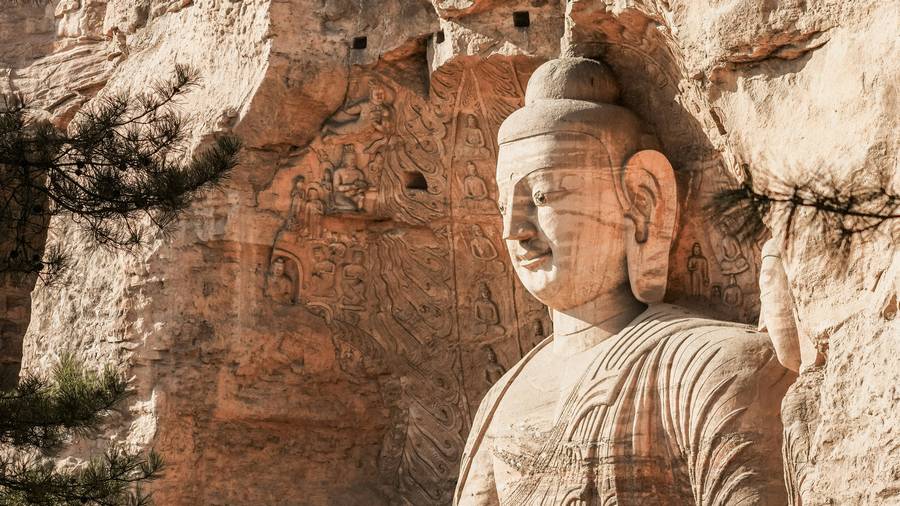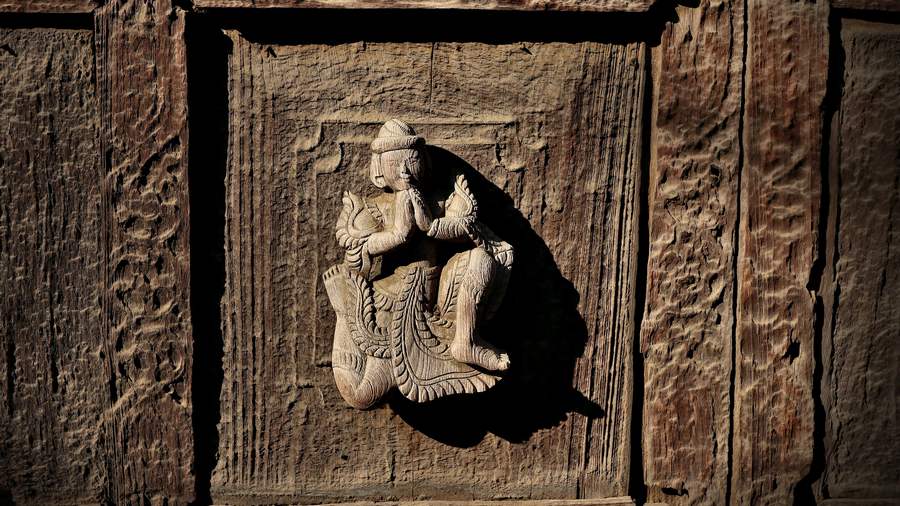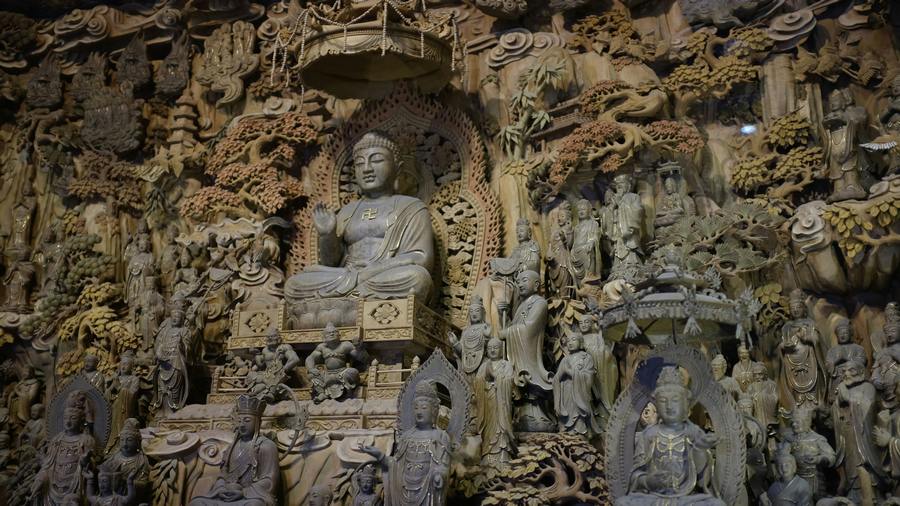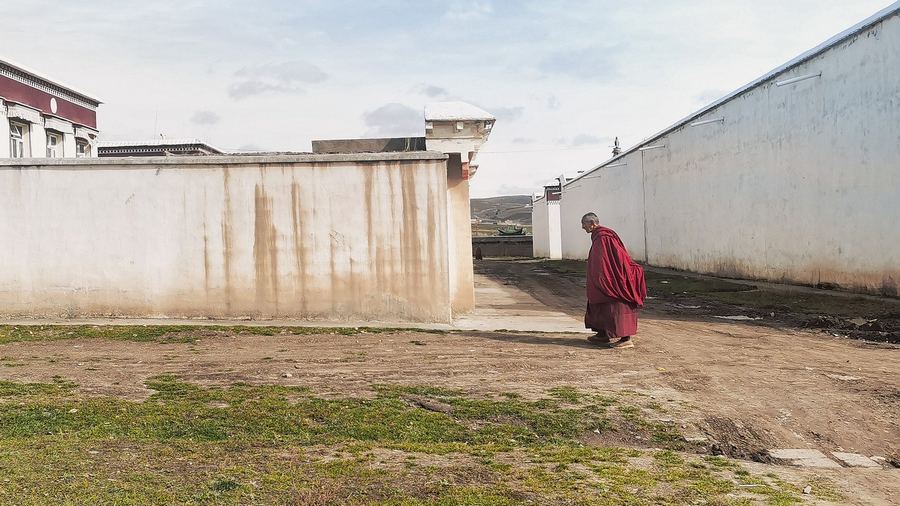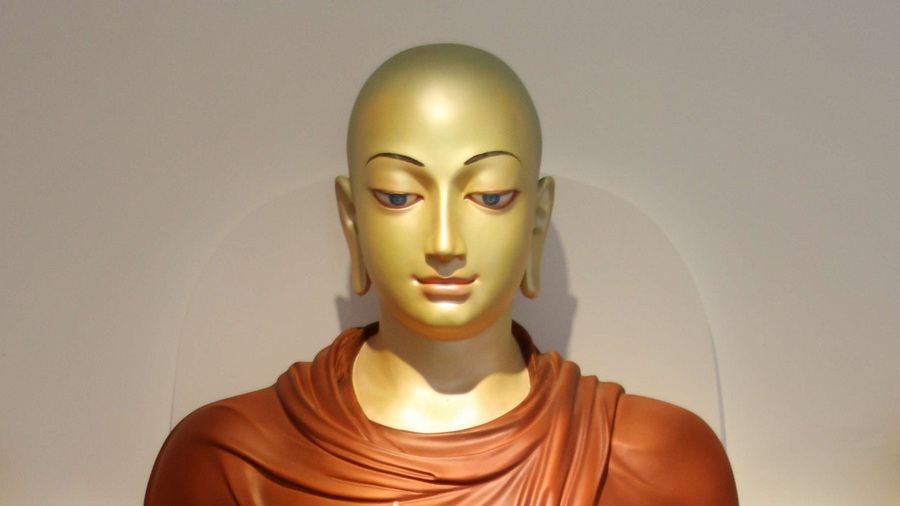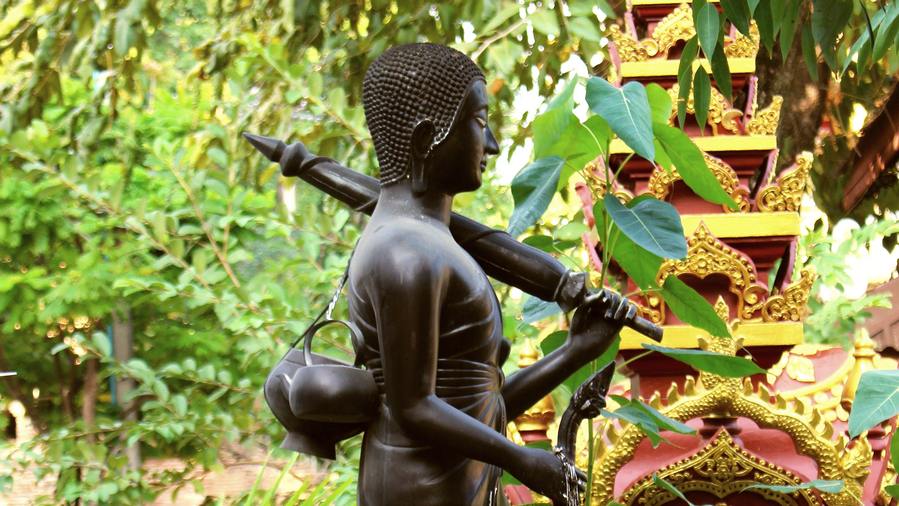[Note: Today’s selection is much longer than usual so we can see the Arahant Sāriputtas great ability to expand upon a topic of Dhamma. It’s a wonderful example of the deep yet practical teachings he was able to give.]
Thus have I heard. On one occasion the Blessed One was living at Sāvatthī in Jeta’s Grove, Anāthapiṇḍika’s Park. There the venerable Sāriputta addressed the bhikkhus thus: “Friends, bhikkhus.”—“Friend,” they replied. The venerable Sāriputta said this:
“Friends, just as the footprint of any living being that walks can be placed within an elephant’s footprint, and so the elephant’s footprint is declared the chief of them because of its great size; so too, all wholesome states can be included in the Four Noble Truths. In what four? In the noble truth of suffering, in the noble truth of the origin of suffering, in the noble truth of the cessation of suffering, and in the noble truth of the way leading to the cessation of suffering.
“And what is the noble truth of suffering? Birth is suffering, ageing is suffering, death is suffering; sorrow, lamentation, pain, grief, and despair are suffering; not to obtain what one wants is suffering; in short, the five aggregates affected by clinging are suffering.
“And what are the five aggregates affected by clinging? They are: the material form aggregate affected by clinging, the feeling aggregate affected by clinging, the perception aggregate affected by clinging, the formations aggregate affected by clinging, and the consciousness aggregate affected by clinging.
“And what is the material form aggregate affected by clinging? It is the four great elements and the material form derived from the four great elements. And what are the four great elements? They are the earth element, the water element, the fire element, and the air element.
The Earth Element
“What, friends, is the earth element? The earth element may be either internal or external. What is the internal earth element? Whatever internally, belonging to oneself, is solid, solidified, and clung-to; that is, head-hairs, body-hairs, nails, teeth, skin, flesh, sinews, bones, bone-marrow, kidneys, heart, liver, diaphragm, spleen, lungs, intestines, mesentery, contents of the stomach, feces, or whatever else internally, belonging to oneself, is solid, solidified, and clung-to: this is called the internal earth element. Now both the internal earth element and the external earth element are simply earth element. And that should be seen as it actually is with proper wisdom thus: ‘This is not mine, this I am not, this is not my self.’ When one sees it thus as it actually is with proper wisdom, one becomes disenchanted with the earth element and makes the mind dispassionate toward the earth element.
“Now there comes a time when the water element is disturbed and then the external earth element vanishes. When even this external earth element, great as it is, is seen to be impermanent, subject to destruction, disappearance, and changeˌ what of this body, which is clung to by craving and lasts but a while? There can be no considering that as ‘I’ or ‘mine’ or ‘I am.’
“So then, if others abuse, revile, scold, and harass a bhikkhu who has seen this element as it actually is, he understands thus: ‘This painful feeling born of ear-contact has arisen in me. That is dependent, not independent. Dependent on what? Dependent on contact.’ Then he sees that contact is impermanent, that feeling is impermanent, that perception is impermanent, that formations are impermanent, and that consciousness is impermanent. And his mind, having made an element its objective support, enters into that new objective support and acquires confidence, steadiness, and resolution.
“Now, if others attack that bhikkhu in ways that are unwished for, undesired, and disagreeable, by contact with fists, clods, sticks, or knives, he understands thus: ‘This body is of such a nature that contact with fists, clods, sticks, and knives assail it. But this has been said by the Blessed One in his “advice on the simile of the saw”: “Bhikkhus, even if bandits were to sever you savagely limb by limb with a two-handled saw, he who gave rise to a mind of hate towards them would not be carrying out my teaching.” So tireless energy shall be aroused in me and unremitting mindfulness established, my body shall be tranquil and untroubled, my mind concentrated and unified. And now let contact with fists, clods, sticks, and knives assail this body; for this teaching of the Buddhas is being practised by me.’
“When that bhikkhu thus recollects the Buddha, the Dhamma, and the Sangha, if equanimity supported by the wholesome does not become established in him, then he arouses a sense of urgency thus: ‘It is a loss for me, it is no gain for me, it is bad for me, it is no good for me, that when I thus recollect the Buddha, the Dhamma, and the Sangha, equanimity supported by the wholesome does not become established in me.’ Just as when a daughter-in-law sees her father-in-law, she arouses a sense of urgency to please him, so too, when that bhikkhu thus recollects the Buddha, the Dhamma, and the Sangha, if equanimity supported by the wholesome does not become established in him, then he arouses a sense of urgency. But if, when he recollects the Buddha, the Dhamma, and the Sangha, equanimity supported by the wholesome becomes established in him, then he is satisfied with it. At that point, friends, much has been done by that bhikkhu.
The Water Element
“What, friends, is the water element? The water element may be either internal or external. What is the internal water element? Whatever internally, belonging to oneself, is water, watery, and clung-to; that is, bile, phlegm, pus, blood, sweat, fat, tears, grease, spittle, snot, oil-of-the-joints, urine, or whatever else internally, belonging to oneself, is water, watery, and clung-to: this is called the internal water element. Now both the internal water element and the external water element are simply water element. And that should be seen as it actually is with proper wisdom thus: ‘This is not mine, this I am not, this is not my self.’ When one sees it thus as it actually is with proper wisdom, one becomes disenchanted with the water element and makes the mind dispassionate toward the water element.
“Now there comes a time when the external water element is disturbed. It carries away villages, towns, cities, districts, and countries. There comes a time when the waters in the great ocean sink down a hundred leagues, two hundred leagues, three hundred leagues, four hundred leagues, five hundred leagues, six hundred leagues, seven hundred leagues. There comes a time when the waters in the great ocean stand seven palms deep, six palms deep…two palms deep, only a palm deep. There comes a time when the waters in the great ocean stand seven fathoms deep, six fathoms deep…two fathoms deep, only a fathom deep. There comes a time when the waters in the great ocean stand half a fathom deep, only waist deep, only knee deep, only ankle deep. There comes a time when the waters in the great ocean are not enough to wet even the joint of a finger. When even this external water element, great as it is, is seen to be impermanent, subject to destruction, disappearance, and change, what of this body, which is clung to by craving and lasts but a while? There can be no considering that as ‘I’ or ‘mine’ or ‘I am.’
“So then, if others abuse, revile, scold, and harass a bhikkhu who has seen this element as it actually is, he understands thus:…repeat §§8—10…At that point too, friends, much has been done by that bhikkhu.
The Fire Element
“What, friends, is the fire element? The fire element may be either internal or external. What is the internal fire element? Whatever internally, belonging to oneself, is fire, fiery, and clung-to; that is, that by which one is warmed, ages, and is consumed, and that by which what is eaten, drunk, consumed, and tasted gets completely digested, or whatever else internally, belonging to oneself, is fire, fiery, and clung-to: this is called the internal fire element. Now both the internal fire element and the external fire element are simply fire element. And that should be seen as it actually is with proper wisdom thus: ‘This is not mine, this I am not, this is not my self.’ When one sees it thus as it actually is with proper wisdom, one becomes disenchanted with the fire element and makes the mind dispassionate toward the fire element.
“Now there comes a time when the external fire element is disturbed. It burns up villages, towns, cities, districts, and countries. It goes out due to lack of fuel only when it comes to green grass, or to a road, or to a rock, or to water, or to a fair open space. There comes a time when they seek to make a fire even with a cock’s feather or a hide-paring. When even this external fire element, great as it is, is seen to be impermanent, subject to destruction, disappearance, and change, what of this body, which is clung to by craving and lasts but a while? There can be no considering that as ‘I’ or ‘mine’ or ‘I am.’
“So then, if others abuse, revile, scold, and harass a bhikkhu who has seen this element as it actually is, he understands thus:…repeat §§8—10…At that point too, friends, much has been done by that bhikkhu.
The Air Element
“What, friends, is the air element? The air element may be either internal or external. What is the internal air element? Whatever internally, belonging to oneself, is air, airy, and clung-to; that is, up-going winds, down-going winds, winds in the belly, winds in the bowels, winds that course through the limbs, in-breath and out-breath, or whatever else internally, belonging to oneself, is air, airy, and clung-to: this is called the internal air element. Now both the internal air element and the external air element are simply air element. And that should be seen as it actually is with proper wisdom thus: ‘This is not mine, this I am not, this is not my self.’ When one sees it thus as it actually is with proper wisdom, one becomes disenchanted with the air element and makes the mind dispassionate toward the air element.
“Now there comes a time when the external air element is disturbed. It sweeps away villages, towns, cities, districts, and countries. There comes a time in the last month of the hot season when they seek wind by means of a fan or bellows and even the strands of straw in the drip-fringe of the thatch do not stir. When even this external air element, great as it is, is seen to be impermanent, subject to destruction, disappearance, and change, what of this body, which is clung to by craving and lasts but a while? There can be no considering that as ‘I’ or ‘mine’ or ‘I am.’
“So then, if others abuse, revile, scold, and harass a bhikkhu who has seen this element as it actually is, he understands thus:… repeat §§8—10…At that point too, friends, much has been done by that bhikkhu.
“Friends, just as when a space is enclosed by timber and creepers, grass, and clay, it comes to be termed just ‘house,’ so too, when a space is enclosed by bones and sinews, flesh and skin, it comes to be termed just ‘material form.’
“If, friends, internally the eye is intact but no external forms come into its range, and there is no corresponding conscious engagement, then there is no manifestation of the corresponding section of consciousness. If internally the eye is intact and external forms come into its range, but there is no corresponding conscious engagement, then there is no manifestation of the corresponding section of consciousness. But when internally the eye is intact and external forms come into its range and there is the corresponding conscious engagement, then there is the manifestation of the corresponding section of consciousness.
“The material form in what has thus come to be is included in the material form aggregate affected by clinging. The feeling in what has thus come to be is included in the feeling aggregate affected by clinging. The perception in what has thus come to be is included in the perception aggregate affected by clinging. The formations in what has thus come to be are included in the formations aggregate affected by clinging. The consciousness in what has thus come to be is included in the consciousness aggregate affected by clinging. He understands thus: ‘This, indeed, is how there comes to be the inclusion, gathering, and amassing of things into these five aggregates affected by clinging. Now this has been said by the Blessed One: “One who sees dependent origination sees the Dhamma; one who sees the Dhamma sees dependent origination.” And these five aggregates affected by clinging are dependently arisen. The desire, indulgence, inclination, and holding based on these five aggregates affected by clinging is the origin of suffering. The removal of desire and lust, the abandonment of desire and lust for these five aggregates affected by clinging is the cessation of suffering.’ At that point too, friends, much has been done by that bhikkhu.
“If, friends, internally the ear is intact but no external sounds come into its range…as in §§27—28…At that point too, friends, much has been done by that bhikkhu.
“If, friends, internally the nose is intact but no external smells come into its range…At that point too, friends, much has been done by that bhikkhu.
“If, friends, internally the tongue is intact but no external flavours come into its range…At that point too, friends, much has been done by that bhikkhu.
“If, friends, internally the body is intact but no external tangibles come into its range…At that point too, friends, much has been done by that bhikkhu.
“If, friends, internally the mind is intact but no external mind-objects come into its range, and there is no corresponding conscious engagement, then there is no manifestation of the corresponding section of consciousness. If internally the mind is intact and external mind-objects come into its range, but there is no corresponding conscious engagement, then there is no manifestation of the corresponding section of consciousness. But when internally the mind is intact and external mind-objects come into its range and there is the corresponding conscious engagement, then there is the manifestation of the corresponding section of consciousness.
“The material form in what has thus come to be is included in the material form aggregate affected by clinging. The feeling in what has thus come to be is included in the feeling aggregate affected by clinging. The perception in what has thus come to be is included in the perception aggregate affected by clinging. The formations in what has thus come to be are included in the formations aggregate affected by clinging. The consciousness in what has thus come to be is included in the consciousness aggregate affected by clinging. He understands thus: ‘This, indeed, is how there comes to be the inclusion, gathering, and amassing of things into these five aggregates affected by clinging. Now this has been said by the Blessed One: “One who sees dependent origination sees the Dhamma; one who sees the Dhamma sees dependent origination.” And these five aggregates affected by clinging are dependently arisen. The desire, indulgence, inclination, and holding based on these five aggregates affected by clinging is the origin of suffering. The removal of desire and lust, the abandonment of desire and lust for these five aggregates affected by clinging is the cessation of suffering.’ At that point too, friends, much has been done by that bhikkhu.”
That is what the venerable Sāriputta said. The bhikkhus were satisfied and delighted in the venerable Sāriputta’s words.
Read this translation of Majjhima Nikāya 28 Mahāhatthipadopamasutta: The Greater Discourse on the Simile of the Elephant’s Footprint by Bhikkhu Bodhi on SuttaCentral.net. Or read a different translation on SuttaCentral.net or DhammaTalks.org. Or listen on PaliAudio.com or SC-Voice.net. Or explore the Pali on DigitalPaliReader.online.
Or read a translation in Deutsch, Русский, বাংলা, Català, Čeština, Español, Français, हिन्दी, Magyar, Bahasa Indonesia, Italiano, 日本語, မြန်မာဘာသာ, Norsk, Português, සිංහල, Slovenščina, Srpski, ไทย, Tiếng Việt, or 汉语. Learn how to find your language.

